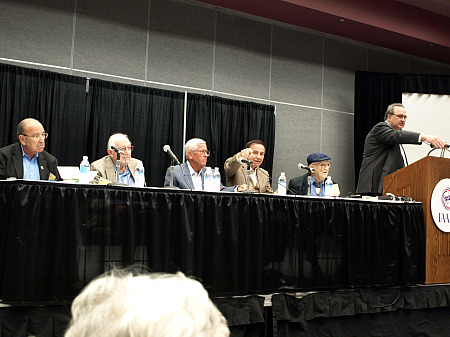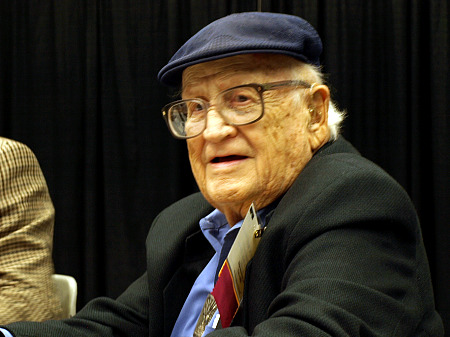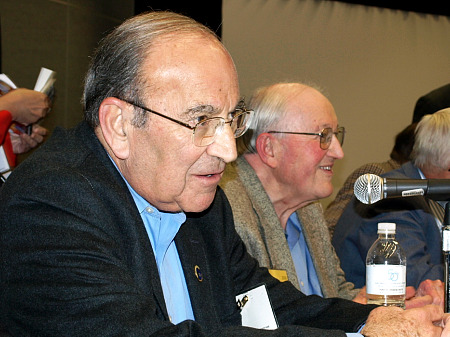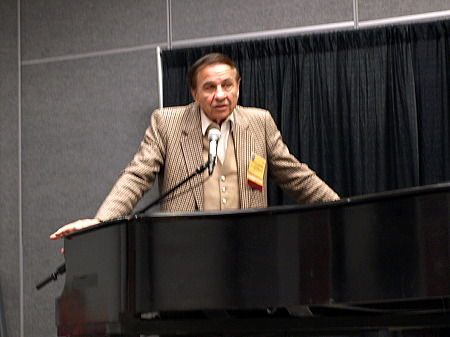With that, Rogers introduced a panel of five Disney legends who were part of that team: Sculptor Blaine Gibson, Engineer Bob Gurr, Consultant Harrison "Buzz" Price, Composer Richard Sherman and Imagineer Marty Sklar.

Combined, these five men possess more than a quarter millennium of experience and wisdom in the theme park industry, Rogers said. Rogers, founder and CEO of BRC Imagination Arts and a former THEA Lifetime Achievement Award winner, brought together these colleagues of Walt Disney at the 2009 IAAPA Attractions Expo to talk about what made Walt's management style so effective, and what today's managers might learn from the way Walt did it.
Working with Walt, Gurr said, "you're going to leave the room more inspired than when you came in it. To me, that's leadership."
Walt hated negativity, Sherman added. He was a very positive man who focused on making improvements, rather than laying blame. Sherman told of one Disney co-worker who criticized a gag in a film the group was working on.
Walt erupted.
"'I don't care if you don't like it,' Walt said. 'Tell me what we can do to make it better'," Sherman recalled.
What an amazing statement. I've worked for my share of graduates of the Marquis de Sade School of Management. (I'm sure that some of you have, too.) These sadists seem to think that managing demands laying blame for every slip-up or missed opportunity - as if the threat of criticism alone will inspire employees to work better.
Walt found a way to push improvement without laying blame. Take a look at what he said - he's not glossing over a problem with the gag. He implicitly acknowledges it could be better. But rather than indulge an employee's criticism of another worker, he demands a positive, forward-thinking attitude - "what we can do to make it better."
All the panelists told stories about how Walt kept employees engaged and contributing by not shooting down suggestions, but instead steering employees toward improving their ideas.
Price described Walt's approach to suggestions as the difference between responding "'Yes, if...' or 'No, because...'."

Nor did Walt offer his employees empty praise.
"There were no 'attaboys' from Walt," Gurr said.
"All we ever heard was "'Hmm. That'll work'," Sherman said.
But that didn't mean Walt couldn't be effusive with praise. He'd walk down the hall and gush about an employee's ideas to co-workers, who'd then head back up the hall to see what that employee was doing and to congratulate him, Gurr said.
"You had to get [praise] second-hand," Gurr said. "That way, no one got a puffy head."
"He knew how to use one employee's word to stimulate another," Gibson added.
"Walt was the greatest casting director who ever lived," Sklar said. "He knew not to pigeon-hole anyone. You never know what you might find when you give someone an opportunity."

Indeed, Sklar joined the company as a UCLA journalism student in 1955, hired to write a tabloid newspaper for Main Street U.S.A. He went on to write for Walt for 10 years, and eventually ended up as president of Walt Disney Imagineering. Gibson joined the movie studio as an animator and ended up as the lead sculptor for WDI. Bob Gurr holds a degree not in engineering, but in design.
"Bob never engineered anything... except everything at Disneyland," Sklar quipped.
To drive home the point, Rogers turned to the audience and asked for a show of hands: "Think back to what you studied in school. Now, how many of you are doing something fundamentally different?"
The majority of the audience raised their hands.
The key to sticking with Walt was never to tell him 'no,' but instead find a way to rise to the challenges that he gave you, Sherman said.
Gurr told about being hired to design the shells of Disneyland's Autopia cars, then being asked by Walt to design the rest of the cars, too. When the ride opened, it ran 40 cars. By the end of its first week, only two still worked, Gurr said.
"That was a pretty good invitation that you needed to learn more," Gurr said of his experience. He said that Walt asked him what he needed to make the cars work more reliably.
"Well, a couple of mechanics to work here and keep the cars repaired," Gurr replied. Within hours, workers showed up at the Autopia site to build a garage.
"Walt could see a need and fix it," Gurr said. "But he didn't criticize the situation you found yourself in."
"Enthusiasm was one of [Walt's] greatest assets in teaching," Gibson said.
Ultimately, that enthusiasm paid off.
"One thing that [Walt] never let is forget was it is all about the audience," Sklar said. "Do something that people would like."
Something theme park audiences have loved over the years has been the music of the Sherman Brothers. Richard Sherman closed the session by spending 10 minutes on the piano, recalling the circumstances under which he and his brother wrote some of the Disney theme parks' most beloved music, including "In the Tiki, Tiki, Tiki Room," "There's a Great, Big Beautiful Tomorrow" and, of course, "It's a Small World."

My audio recording of Sherman's performance is available at this link.
Tweet
Did they take any questions? Say what you want about Disney, but they really are the ones that jump started theme parks and these men knew the mindset of Walt Disney and probably found themselves doing something they never thought they would ever do!
I think several of today's theme park managers/presidents could benefit from a crash course in Walt Disney style leadership - including the current Disney heads!
I also wonder how similar Lasseter and even Jobs (today's Jobs, not the 1984 "I'll fire you if you look the wrong way" Jobs) are to Walt? They both seem to have Walt's same passion, vision, and goal-oriented approach. Hmmm, I also wonder how Walt would have fared in our Great Big, Cut-throat, Money-grabbing, Not-So-Beautiful Tomorrow...
I do, however, have one criticism (not about the article itself, but rather about the inspiration). I'm reading Walt Disney: The Triumph of the American Imagination by Neal Gabler, and it seems Walt constantly blamed employees and lost his temper with them (at least in the animation days). He blamed everything and everybody for any little problem. He blamed communism for causing his workers to strike. He blamed his employees' distrust for the company for his economic hardships. He blamed Art Babbitt for just about everything.
Regardless, Walt was still a phenomenal man, and this article was excellent.
But the overall focus of his management, according to the panelists, was positive. While he certainly indulged in moments of self-pity and blame, he didn't allow those to define him or his management style. Simply, he didn't take that stuff seriously, the mood passed, and he moved on.
Contrast that with other managers who do define their leadership negatively, with constant attacks on others.
That said... there was one group Walt did not care to manage in a positive way. Gibson told the story about one day when Walt decided he needed to offer an extra reward to his employees: "'I want all these folks who have worked so hard, and their families, to go to Disneyland,'" Gibson quoted Walt as saying.
"'Except the accountants.'"
Gurr and Sherman namechecked Bob Iger in reference to how much larger the company was now than in Walt's day.
But Buzz Price let Michael Eisner have it for a moment, when talking about Walt's decision to keep Buzz outside the company to do his economic analysis and development feasibility studies. (Buzz's old company, ERA, continues to work as a leading consultant in the themed entertainment industry.)
"He could have done what Mr. Eisner did," Price said. "Put 100 people in strategic planning and create turmoil in the company."
Rogers steered the focus back to Walt, but I could feel the resentment steaming from Price. If you've read his book, you'll know that this is the guy who also dripped skepticism onto the page when writing about the former Premier Parks' acquisition of the Six Flags chain. He didn't like Eisner's business management and he didn't like the Premier Parks deal. Can you tell that Buzz Price is totally my kind of guy? :-)
This article has been archived and is no longer accepting comments.